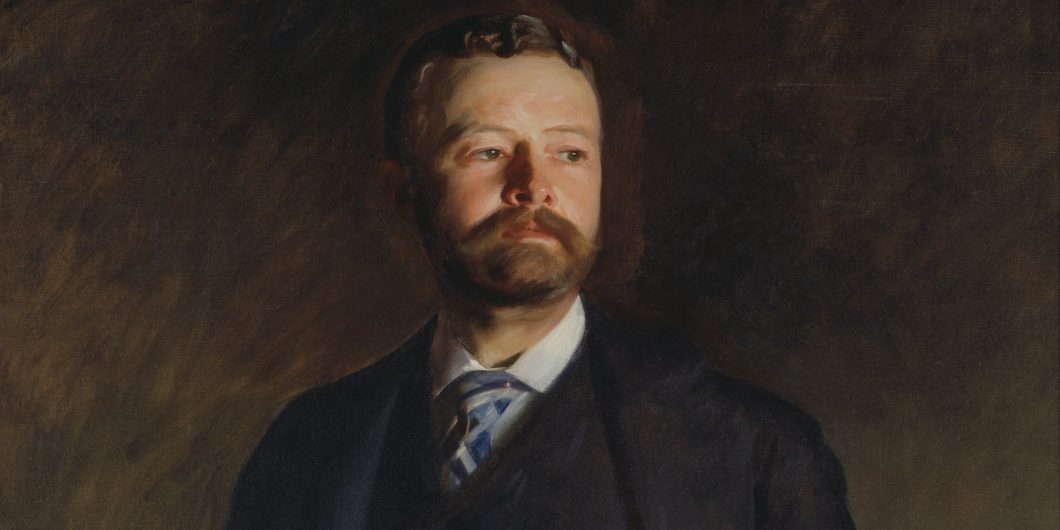Massachusetts Values and the Filibuster: A Short History
In a recent interview with Axios, Elizabeth Warren complained that the Senate filibuster has “deep roots in racism” and lambasted it for providing “a veto for the minority.” In a democracy, she added, the “majority rules” in all cases. Warren does not doubt that the filibuster was designed for the sole purpose of giving “the South the ability to veto any effective civil rights legislation or anti-lynching legislation.” These are serious charges against a rule that, established in 1806, has for over two hundred years given life to the Senate’s identity as “the world’s greatest deliberative body.”
If Warren is correct that the filibuster has always been solely a weapon for racist Southerners, one would expect that Senators from Massachusetts have always been at the forefront of efforts to destroy the filibuster rule. One might be surprised, then, to learn that one of Warren’s predecessors as a Massachusetts Senator a century ago—Henry Cabot Lodge—had a very different view of the filibuster and, consequently, of the Senate as an institution. Though Lodge had railed against Senate obstruction as a young Congressman in 1893, he later confessed that “within a year or two” of his ascension to the Senate, he had concluded that the filibuster was a wise practice and that its annihilation would “alter completely the character of the Senate.” Lodge argued that the filibuster was not merely a disposable procedural rule, but a practice that followed naturally from the structural philosophy of the United States Senate, which he revered for its emphasis on deliberation, minority rights, and traditionalism.
The Senate Is Not the House
Though he is most well-known for his successful battle in 1919 as Senate Majority Leader to keep America out of the League of Nations, Lodge was also a first-rate historian and political thinker. He was one of the first citizens of the United States to receive a Ph.D. in history and government, and—even while he served as a Senator—his scholarly output was impressive. Inconveniently for Elizabeth Warren, Lodge was also a firm New Englander in both his ancestry and his intellectual commitments, so his defense of the filibuster cannot easily be dismissed as a specious rationalization for Southern slavocracy. Not only was Lodge a firm supporter of the Union during the Civil War, but he also spearheaded a voting rights bill for African Americans known as the Lodge Federal Elections Bill of 1890. Even though this bill suffered defeat at the hands of a partisan Democratic filibuster, Lodge did not allow his disappointment to change his view of the filibuster rule. “I was deeply and profoundly interested in the force bill, as it was called,” he reflected in a Senate speech in 1903:
I had it in charge in the House of Representatives and I saw it defeated on this floor by methods of obstruction. But, Mr. President, I had much rather take the chances of occasional obstruction than to put the Senate in the position where bills could be driven through under rules which may be absolutely necessary in a large body like the House of Representatives or in the House of Commons, but which are not necessary here. I think here we should have, minority and majority alike, the fullest opportunity of debate.
Lodge did not regard the Senate filibuster as a tool to entrench minority rule but instead maintained that it was a method of improving and refining majority rule. The filibuster ensured that the “majority in this Senate” would be “something more than a numerical majority at any given moment.” By providing a “full opportunity for deliberation and discussion” on legislation, the filibuster would prevent legislation from being signed into law by the President with the support of only flimsy congressional majorities. Lodge recognized that the Senate’s protections for debate provided minorities and majorities alike with the potential to refine the public mind on proposed legislation. Members could bring every one of a bill’s consequences to the attention of the people before the next election. The high vote threshold to end filibusters, established in 1917, would encourage the majority party to build a real majority coalition for bills—not simply a narrow or fluctuating majority—by working to gain some support from members of the minority party. The ultimate value of the filibuster rested in the fact that it guaranteed that there would be “one body in the government where debate cannot be shut off arbitrarily at the will of a partisan majority.”
The Senate was designed to represent “a political entity as different as possible” from the House of Representatives—namely, the states.
Lodge would undoubtedly lament recent changes to the filibuster that have deemphasized debate on the floor by political minorities, turning it into a mere procedural mechanism to kill bills. The filibuster as Lodge understood it operated best when it facilitated debate on the Senate floor and—understood in this light—Joe Biden’s recent proposal to restore the “talking filibuster” may be surprisingly in keeping with the traditions of the upper chamber as Lodge understood them, so long as it is not a stepping stone to more radical changes. In requiring members of the minority to stand on the floor and speak for hours at a time, the talking filibuster imposes a burden on the minority. On the other hand, the majority is required to stay on the floor and consider the views of the minority Senator. Trade-offs exist for both the majority and the minority. Though the potential for obstruction still remains, Lodge would hold that this possibility is outweighed by the fact that all reservations to bills could be articulated to the people without a slim majority shutting down debate. Lodge would never sanction the abandonment of the filibuster in favor of absolute majority rule, but he would likely have serious reservations with the “silent filibuster” for downplaying debate and being far more liable to abuse.
Lodge suggested that efforts to abolish the filibuster indicated a fundamental misunderstanding of the Senate as an institution. Each member of the House of Representatives is elected biannually, so that body has a very real mandate to express the changing mood of the nation’s voters with prompt legislation. The filibuster rule would thus be wholly inappropriate there, especially given that the House’s vast size exacerbated the potential for abuse by obstructionists. Lodge contended, however, that the Senate is fundamentally distinct from the House in its structure and mission. The Senate does not represent “a majority of voters set off in arbitrary districts,” as the House of Representatives does. Nor does the Senate intend to allow majority rule to be “rashly or hastily exercised.” In fact, Lodge insisted that the Senate existed to represent the states as unique political societies—not the majority of the nation’s voters—and he expressed that one of its most profound purposes was to check the rash legislation that would inevitably be produced by the House of Representatives.
Contrary to Warren’s proclamation that the purpose of the Senate is to promote majority rule, Lodge argued that the Senate was never designed to institutionalize the rule of the majority of voters throughout the nation. The Senate was designed to represent “a political entity as different as possible” from the House of Representatives—namely, the states. The Senate was composed “not of representatives of popular constituencies, but of the ambassadors of sovereign States.” The distinctive constituency of the Senate, to Lodge, accounted for its power and prestige as an institution. “One great secret of the strength and influence of the Senate,” Lodge remarked, “has been the fact that it did not represent the same constituencies as the House of Representatives.” Because the Senate represents states by affording them equal representation irrespective of population, it is impossible to argue that it was designed to express a purist conception of national majority rule. On the contrary, the Senate’s goal was to protect the rights of citizens in small states from tyrannical actions by the powerful national majorities that would dominate the lower chamber. The implications of this fact for the filibuster rule are massive. As Lodge perceived it, the filibuster aligned with the essential mission of the Senate—namely, to protect political minorities from hasty and potentially tyrannical decisions by political majorities.
To Lodge, the equality of the states in the Senate was not merely a peripheral feature of the Constitution. Without it, “there probably would have been no Constitution at all.” He acknowledged that the equality of the states was not, as Warren and others of her ilk might believe, produced by Southern slaveholders at the Constitutional Convention. The two men most responsible for this feature of the constitutional system were two New England statesmen: Oliver Ellsworth and Roger Sherman. Lodge praised Ellsworth and Sherman for recognizing at the Convention that “the only road to success lay through grafting a new government upon the State governments.” For Lodge, as for Ellsworth and Sherman, the states were more than just artificial entities that amassed individual voters into convenient districts. The states were unique political societies with their own habits, customs, and traditions, and each mightily contributed to the overall health of the federal republic. Lodge questioned whether the federal government could be genuinely representative if it gave the states no voice in the affairs of government. “The abolition of the States,” he emphasized, “would mean the loss or the ruin of the great principle of local self-government, which lies at the very root of free popular government and of true democracy.”
The Conservative Institution Under Siege
If the equality of the states in the Senate was not enough to indicate that the upper chamber represented the states, the original mode of appointment for Senators clarified this fact beyond all doubt. Lodge lauded the Framers for their wisdom in giving state legislatures the right to choose Senators, the mode of election that prevailed until the passage of the Seventeenth Amendment in 1913. Because Senators answered to the state legislatures, the Senate served as a sober institution, one insulated from the violent passions of national partisan politics. Lodge argued that, historically, the involvement of the state legislatures in the selection of Senators produced able legislators who gave “strength and continuity” to the administration of government in the United States.
Lodge forecast that the Seventeenth Amendment would damage the “quality and character” of the Senate by giving its members more of an interest in winning popular re-election contests than in forging laws to express the deliberative will of the country.
The staggered six-year term in office for Senators, in conjunction with their frequent reappointment by the state legislatures, produced men who “had terms of service ranging from twelve to more than thirty years.” Their long service gave them a vested interest in the institution of the Senate, not as a mere platform to run a viable presidential campaign, but as a deliberative institution which valued stability, tradition, and continuity. Established and unbroken since 1806, the filibuster was just one of many rules, for Lodge, that reflected “the conservatism of the Senate.”
Lodge resented that, in his own time, the Senate was under siege by Progressive reformers. The Progressives were deeply uncomfortable with the Senate because of its structural regard for federalism and traditionalism, and they fought for the direct election of Senators to make the upper chamber more immediately responsive to the will of the nation’s voters. Lodge predicted in 1902 that if the Progressives successfully amended the Constitution to elect Senators by direct popular vote, “the most radical revolution conceivable will take place in our form of government.” As he explained:
We alone among the nations possessing representative government have fully solved the problem of an upper House resting upon an independent basis and effective in legislation. If the Senate is placed upon the same basis as the House and is chosen in the same way by the same constituency, its character and meaning depart, the States will be hopelessly weakened, the balance of the Constitution will be destroyed, centralization will advance with giant strides, and we shall enter upon a period of constitutional revolution of which the end cannot be foretold.
Lodge feared that the passage of the Seventeenth Amendment would distort the public’s understanding of the Senate as an institution. Because the equality of the states remained, he believed that the Amendment failed to abrogate the basic, non-majoritarian principle of the Senate; namely, representation for the states as opposed to national majorities. Nevertheless, he forecast that the Amendment would damage the “quality and character” of the Senate by giving its members more of an interest in winning popular re-election contests than in forging laws to express the deliberative will of the country. Additionally, with the states exiled from the selection of Senators, the upper chamber would wrongly begin to perceive itself primarily as a majoritarian, national body rather than as a federalist institution based upon deliberation and consensus. Lodge ominously forecast that the victory of the Seventeenth Amendment would eventually inspire the people to abolish other features of their constitutional system that promoted local self-government, including the Electoral College and the equality of the states in the Senate. Understood in this light, recent majoritarian attacks on the filibuster follow quite naturally out of the specious thinking that guided the architects of the Seventeenth Amendment.
Over a hundred years after the passage of the Seventeenth Amendment, the Democratic Senate leadership is seriously considering abolishing the filibuster, one of the remaining vestiges of that institution’s deliberative past. Lodge’s haunting predictions have come full circle. Elizabeth Warren, who holds the same Senate seat that Lodge once did, hopes to destroy the filibuster to thrust the “For the People Act of 2021” through Congress with as little deliberation as possible. In doing so, Warren and her allies are indulging in a long Progressive tradition of advancing radical change to the American political system in the name of “the people.” Lodge himself noted in 1911 that Progressives spoke “continually about trusting the people and obeying the people’s will.” In truth, he averred, “this is not what they seek.” The true aim of Progressivism was to ensconce the rule of a “narrow, ephemeral, and fluctuating majority” at the cost of the long-term, stable, and deliberative will of the American people.
Lodge argued that the supposedly democratic agenda of the Progressives would invariably result in the passage of “legislation of the most radical, the most revolutionary character”—not legislation reflecting the genuine consensus of the whole society. As the American people confront a Congress that is bent on living up to these dark predictions, they would do well to consider the admonitions of Henry Cabot Lodge a century ago.



